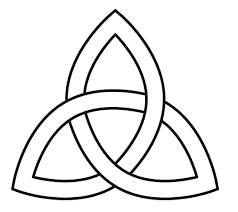GOD IN 3D?
A couple of weeks ago was Trinity Sunday. I was on holiday in Devon, so my Facebook didn’t get a l ook-in. But here are some thoughts I have about what western Christians think is a great problem, and eastern Christians take as a fundamental truth.
ook-in. But here are some thoughts I have about what western Christians think is a great problem, and eastern Christians take as a fundamental truth.
There is a great little book called “The Orthodox Way” by Kallistos Ware, explaining simply how Orthodox Christians (i.e. Greece, Palestine, Egypt, Russia etc.) understand Christianity. The first chapter is “God as Mystery”. God is in such a different category from us (Creator/created, Infinite/finite for example) that ultimately the best we can say about God is, “I don’t know”. The next chapter is about what instantly springs to mind when we start thinking about God. It is ”God as Trinity”. Surprising? To western Christians, yes. For example, in a book about Christianity by a celebrated 19th century German theologian Schleiermacher, the Trinity is relegated to an appendix.
Who is right?
One big problem which makes it really hard to talk about this is the problem of language. Christian ministers talk about the Trinity being “Three Persons in one God”. Some theologians talk about a heavenly dance with the three persons interweaving, rather like some celestial tea party. No wonder that Muslims think that Christians worship three gods. (Though traditionally they think that Christians worship God, Jesus and the Virgin Mary).
The problem comes with the word “Person”. At the beginning of the church, everyone spoke Greek. The New Testament was written in Greek, all the church services were in Greek. Greek was the “lingua franca” of the Roman world, similar to how English was the common language in British India. It was not until about 300 AD that Latin started to take over in the West. The Greek theologians talked of God as having three “prosopa”. The word means “face” or “actor’s mask” – the outward surface you show to the world. When Latin came to be used, “prosopon” was translated as “persona”. This also means face or actor’s mask, but increasingly it came to its modern meaning of the total person, inside thoughts and feelings and opinions as well as the physical outside. When we start to think like this we quickly get to the stage of having three Gods with all sorts of unfortunate consequences (e.g. the God of the Old Testament is an angry God, Jesus is a loving God, the Spirit is little more than a ghostly presence).
If we stick to the original meaning, we can see that the idea of God as Trinity means to show us not three individuals, but three aspects of God, or three dimensions of God.
The word “Trinity” – meaning three-in-one, was first coined by Tertullian (155-240 AD). But the idea goes back to the beginning of the New Testament. I find one particular passage illuminating: Paul’s first letter to the Corinthians, c. 56 AD, one of the very earliest Christian writings we have. Paul is not trying to make a theological point here, he is simply trying to get these new Christians, Jewish and Gentile Christians in the cosmopolitan port of Corinth, to stop squabbling with each other.
“Now there are varieties of gifts, but the same Spirit; and there are varieties of services, but the same Lord; and there are varieties of activities, but it is the same God who activates all of them in everyone.” (1 Corinthians 12.4-6)
Paul says that it is the Spirit who gives us spiritual experiences, who works in us from the inside. The Lord is the title that Paul always gives to Jesus, referring to the Jewish name for God “Adonai”, and it is Jesus who inspires us to help others, to serve them. This is a clear reference to the words of Jesus, “The Son of Man came not to be served but to serve, and to give his life as a ransom for many.” (Mark 10.45) When Paul talks about God “working” in people, he uses the same word as is used for the creation of the world in Genesis 1.
In other words, we know of God in three dimensions: as Creator of the universe – clearly beyond us. The Son who teaches us to help others, shown to us in Jesus. The Spirit who lives in us and provides spiritual gifts.
The three dimensions of God: the One Beyond us; the One With us; the One In us.
It makes sense to me. I hope it makes sense to you.
